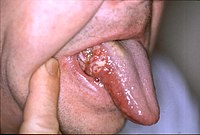
Photo from wikipedia
Study Objective: The COVID-19 pandemic caused by the severe acute respiratory coronavirus 2 (SARS-CoV-2) has significantly affected the provision of routine and acute medical care. The aim of this report… Click to show full abstract
Study Objective: The COVID-19 pandemic caused by the severe acute respiratory coronavirus 2 (SARS-CoV-2) has significantly affected the provision of routine and acute medical care. The aim of this report is to characterize patients with cancer presenting to EDs in the United States and COVID-19 mortality risk according to tumor subtype. Methods: The RECOVER registry represents a collaboration between 45 EDs spanning 27 states. This retrospective registry enrolled patients from each study site who received molecular diagnostic testing as part of ED care due to clinical suspicion for COVID-19 disease. Clinical characteristics pertaining to a patient’s cancer status were obtained from medical record review, specifically cancer type, active versus remission status, metastatic versus isolated tumor, and hematologic versus solid tumor status. Cancer type was further classified as solid/hematologic tumor localized or metastatic based on documented diagnoses and/or past medical history. Results: There are a total of 2865 patients who have a reported history of cancer, 1899 (66.3%) were negative for COVID-19 and 33.7% were positive on COVID-19 testing. There are higher percentages of minority-identifying patients in the COVID-19 positive cohort as compared to the negative cohort, namely Black or African American (33.9% vs 13.5%, respectively, p<0.001), and unknown/other (20.5% vs. 7.1%, p<0.001). Breast cancer was the most common solid tumor presenting in this cohort, with 19.6% of the COVID-positive cohort compared to 9.6% of the COVID-negative cohort (p=0.099). The next most common cancers in the cohort were colorectal (7.5%) and prostate (6.9%), however there were no statistical differences between the cohorts. The mortality rate for COVID-19 positive patients was 24.2% versus 9.9% for the COVID-19 negative rate (p<0.001, OR 1.96). Patients with breast cancer had a much higher mortality rate when associated with a COVID-19 positive test (26.4% versus 10.2%, p<0.001, OR 3.27). Similarly, colorectal cancer, prostate cancer, and leukemias experienced higher mortality rates for COVID-19 positive patients, 31.4% versus 13.2%, 31% versus 12.4%, and 30.8% versus 16.4% (all p<001). For patients with a documented history of cancer in remission, they also experienced higher mortality rates when associated with a positive COVID-19 test, namely 21.3% versus 7.2%. Conclusion: This study represents one of the largest COVID-19 cancer-related studies with 966 patients with a history of active cancer and SARS-CoV-2 infection. Patients with cancer present to the ED with diverse symptoms, treatment regimens, and having a diagnosis of COVID-19 is associated with higher mortality rates. Because of the high mortality rates observed for several of the cancer types in this study, initial evaluation of patients in the ED, subsequent ED therapies, and close communication with treating oncologists is of the utmost importance. [Formula presented]
Journal Title: Annals of Emergency Medicine
Year Published: 2021
Link to full text (if available)
Share on Social Media: Sign Up to like & get
recommendations!